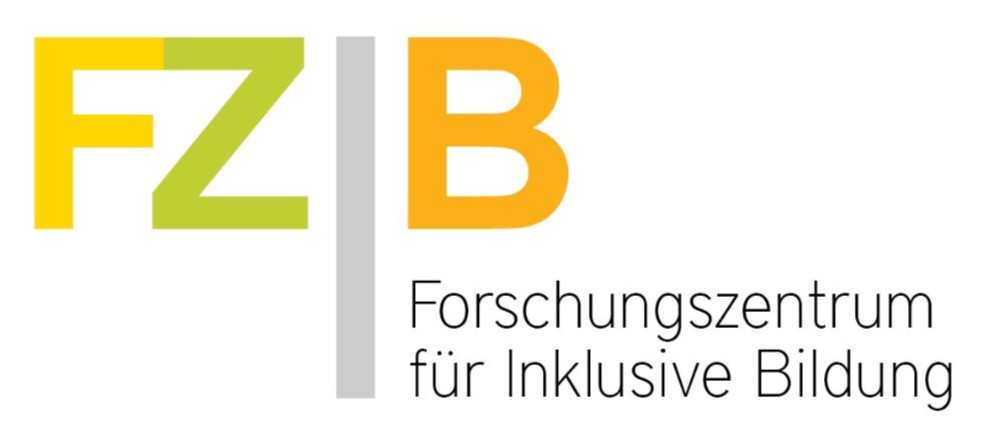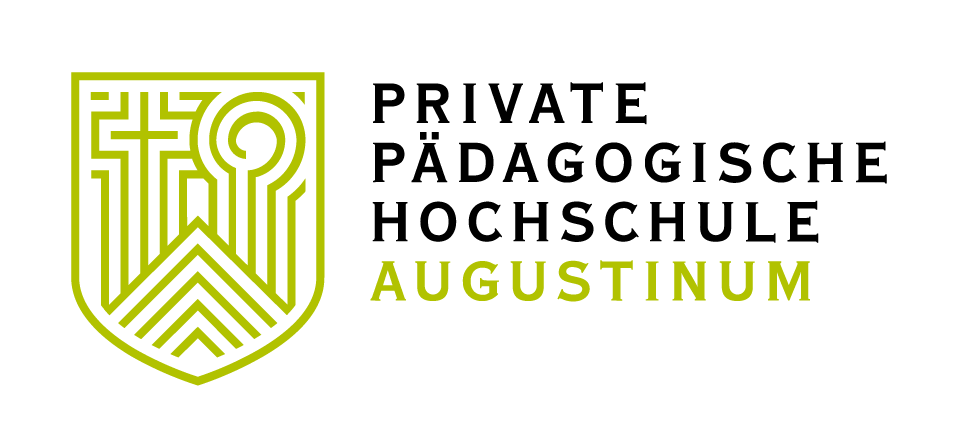Conference report IFO 2024 "Inclusion.Resilience.LearningSystems!"
How can inclusion contribute to the resilience of an education system? How can inclusion in the education system be made more resilient?
This was the title of the 37th Annual Conference of Inclusion Researchers, which took place from 26.02. to 28.02.2024 as a face-to-face event in Graz and from 29.02. to 01.03.2024 as an online conference. The conference was a place for networking and exchange for more than 300 inclusion researchers.
The conference was organized by the Research Center for Inclusive Education (RCIE) with the cooperating institutions University of Graz, University College of Teacher Education Styria and Private University College of Teacher Education Augustinum.
The conference proceedings entitled "Resilienz.Inklusion.Lernende Systeme" have now been published and bring together selected presentations from the 37th Annual Conference of Inclusion Researchers. The OA volume is available on the Klinkhardt website www.klinkhardt.de. The editorial team Edvina Bešić, Daniela Ender and Barbara Gasteiger-Klicpera would like to thank for the many contributions!
Website: https://ifo2024.at

In this video you get live impressions of IFO 24 with statements on inclusion and highlights from the participants' perspective. We would like to thank Dipl.-Ing. (FH) Roland Radlinger from the Center for Digital Teaching and Learning at the University of Graz for camera and production, as well as the interviewers Mag. Christina Odescalchi MSc and Dominik Pendl MSc PhD from RCIE.
"3 Universities, 3 locations, 3 event days!" The Research Center for Inclusive Education, a cooperation between the University of Graz, the Private University College of Teacher Education Augustinum and the University College of Teacher Education Styria, hosted the 37th Annual Conference of Inclusion Researchers 2024 on the topic of "Inclusion. Resilience. Learning systems." A total of 339 participants took part in the conference. 210 researchers visited Graz and 129 attended the online format of the congress. In four excellent keynote speeches by internationally renowned researchers and in numerous panel sessions, participants were able to find out about the current state of inclusion research, discuss research topics and create new networks or deepen existing ones.
The opening ceremony took place on 26.02.2024 in the auditorium of the University of Graz. The rector Ao. Prof. Dr. Beatrix Karl (University College of Teacher Education Styria) and Rector Dr. Andrea Seel (Private University College of Teacher Education Augustinum), as well as Vice-Rector Prof. Dr. Joachim Reidl (University of Graz) welcomed the numerous participants and emphasized the special importance of the RCIE in research on inclusion.
The conference management team, Univ.-Prof. Dr. Barbara Gasteiger-Klicpera (University of Graz), Prof. Daniela Ender, BA MSc. (Private University College of Teacher Education Augustinum) and Prof. Silvia Kopp-Sixt, MA BEd (University College of Teacher Education Styria) emphasized the importance of resilience for the further development of inclusion in the education system and thus placed the conference topic at the center of interest.
Prof. Mel Ainscow and Prof. Kiki Messiou inspired the participants with their keynote speech on "Developing inclusive education systems: barriers and pathways". Their contribution led to stimulating discussions on ways to further develop inclusion in schools. The morning was moderated by Assoc. Prof. Susanne Seifert, PhD.
Here you can find the recording of the keynote speech by Prof. Mel Ainscow and Prof. Kiki Messiou (with subtitles de/en), here the presentation.
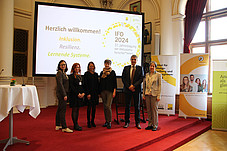
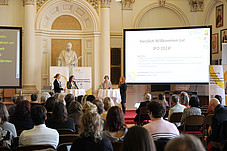
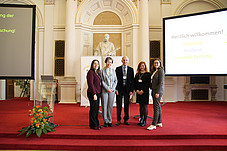
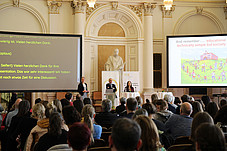
In the afternoon, results from different areas of inclusion research were presented in six parallel tracks. The special educational review and assessment process was questioned as a contribution to individual and/or systemic resilience, but resilience as a political resilience and the connection between democracy and inclusion were also discussed.
In the early evening, the network of Austrian inclusion researchers (IFÖ) and the members of the BiDok Germany funding association met in open spaces for an informal exchange.
In the evening, the researchers were welcomed by Philipp Ulrich, a representative of Mayor Elke Kahr, at Graz City Hall, where they were able to round off the day with a cozy buffet.
The second day at the PPH Augustinum began with a keynote speech by Prof. Dr. Michael Fingerle, University of Frankfurt, who addressed the difficult relationship between inclusion and resilience and presented a philosophical foundation for resilience in educational and development processes. He argued that resilience should not be understood as a personal characteristic, but rather as an adaptive capacity of organizations or social groups that are challenged by inclusion in terms of social and educational policy and described the education system as particularly resilient, as it "has been exposed to countless attempts at reform and has survived them largely unchanged".
You can find the recording of Prof. Michael Fingerle's keynote speech here (with sign language interpretation, subtitling de/en), here the presentation.
The third keynote was given by Prof. Dr. Kathrin Müller from the Intercantonal University for Special Needs Education Zurich. She linked the findings from resilience and inclusion research and discussed these for the pedagogical promotion and didactic design of learning for inclusion-oriented participation. In this tense process, learning and teaching participation requires an "equal interplay between those taking part and those giving part". By understanding and taking into account the position of the other person, "irritations can be used as a learning opportunity" and resilience can also be promoted by fostering the skills that enable participation.
Here you can find the recording of Prof. Kathrin Müller's keynote speech (with sign language interpreter, subtitles de/en), here the presentation.
At 14:00, the congress management and the president of LebensGroß, Ursula Vennemann, invited participants to the poster session. At the beginning, the authors were briefly introduced and had the opportunity to present their poster as a 1-minute pitch. Afterwards, the congress participants were invited to talk to the authors during an integrated coffee break, exchange views on the projects presented and vote for their favorite. The presentation of the poster awards and prizes for the top three was the highlight of this afternoon's congress.
Before the joint social evening, all participants were invited to a panel discussion on the exciting topic of "Inclusion makes you resilient! - Is the education system ready?". Erika Wilfling-Weberhofer (Styrian Association for People with Disabilities), Christine Steger (lawyer for equal treatment issues for people with disabilities), Matthias Grasser (cultural and social projects), Prof. Barbara Levc (university lecturers with disabilities working for students with disabilities/chronic illnesses), Christian Schoier and HR Dr. Josef Zollneritsch (Directorate of Education) discussed this topic. The panelists regretted the steps backwards that Austria has taken in the area of inclusion in recent years. The independent monitoring committee for monitoring the implementation of the UN CRPD confirms that there is still a lot of potential for development. "Thanks to intensive exchange and joint initiatives by committed individuals, we can nevertheless look to the future with optimism," was the group's final conclusion.
The highlight of the third day at the University of Teacher Education Styria was the keynote speech by Prof. Dr. Kerstin Merz-Atalik from the Ludwigsburg University of Education. She focused on the importance of individual, collective and organizational forms of resilience for transformation processes and for the sustainable development of inclusive education systems. The associated research findings were illustrated using the example of the Governance in(clusive) Education project, the aim of which is to gain knowledge for successful governance for inclusive education in an international comparison and in concrete terms in four European education regions.
Here you can find the recording of the keynote speech by Prof. Kerstin Merz-Atalik (with sign language interpretation, with subtitles de/en), here the presentation.
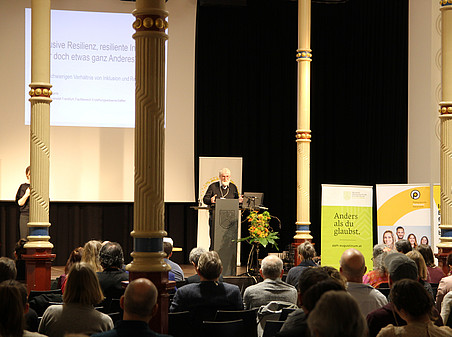
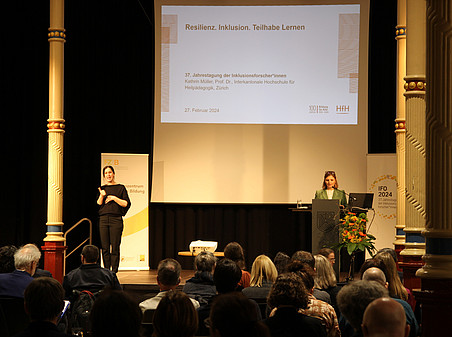
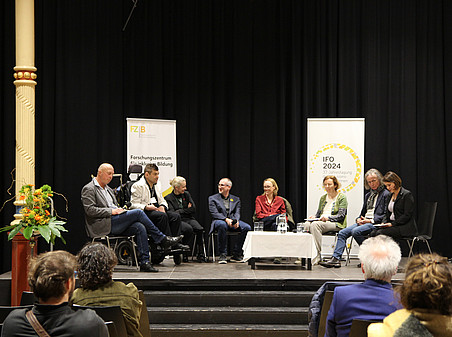
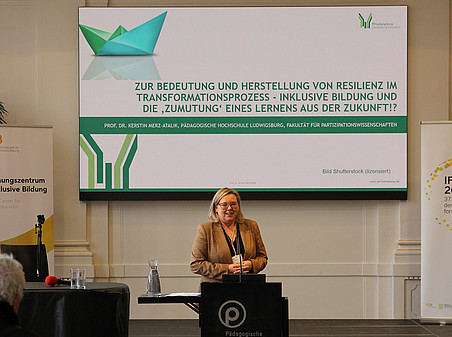
At the closing ceremony, the IFO 2023 conference proceedings were presented by the team of authors and an outlook on the next conferences was given.
Here you can find the Photo gallery of the presence conference. We would like to thank the photographer Fransika Reitegger MSc!
Following on from the previous congresses, which were held partly online and partly hybrid, the Graz team was also keen to provide an online offering with the aim of accessibility and freedom from barriers, as well as the opportunity to participate from near and far. The congress was therefore continued in online format on Thursday and Friday. The 129 participants were delighted with the opportunity to take part in the congress digitally and experience recordings of all four keynotes as well as moderated discussions on these thematic highlights. The moderation was once again in the proven hands of Assoc. Prof. Susanne Seifert, PhD, and the IFO management team.
We look back with gratitude on a productive week and look forward to presenting the conference proceedings at the next IFO.
At the same time, we can now pass on the baton to the team from the University of Cologne for 2025, followed by the University of Bremen in 2026 and the Stefan Zweig University College of Teacher Education Salzburg in 2027! We are already looking forward to the IFO conferences in the coming years!
Announcement of the IFO 2025:
Title: "Inclusion - Education - Transformation: Inclusive education as transformation - transformation through inclusive education"
Date: 17.02.-19.02.2025 Location: University of Cologne
